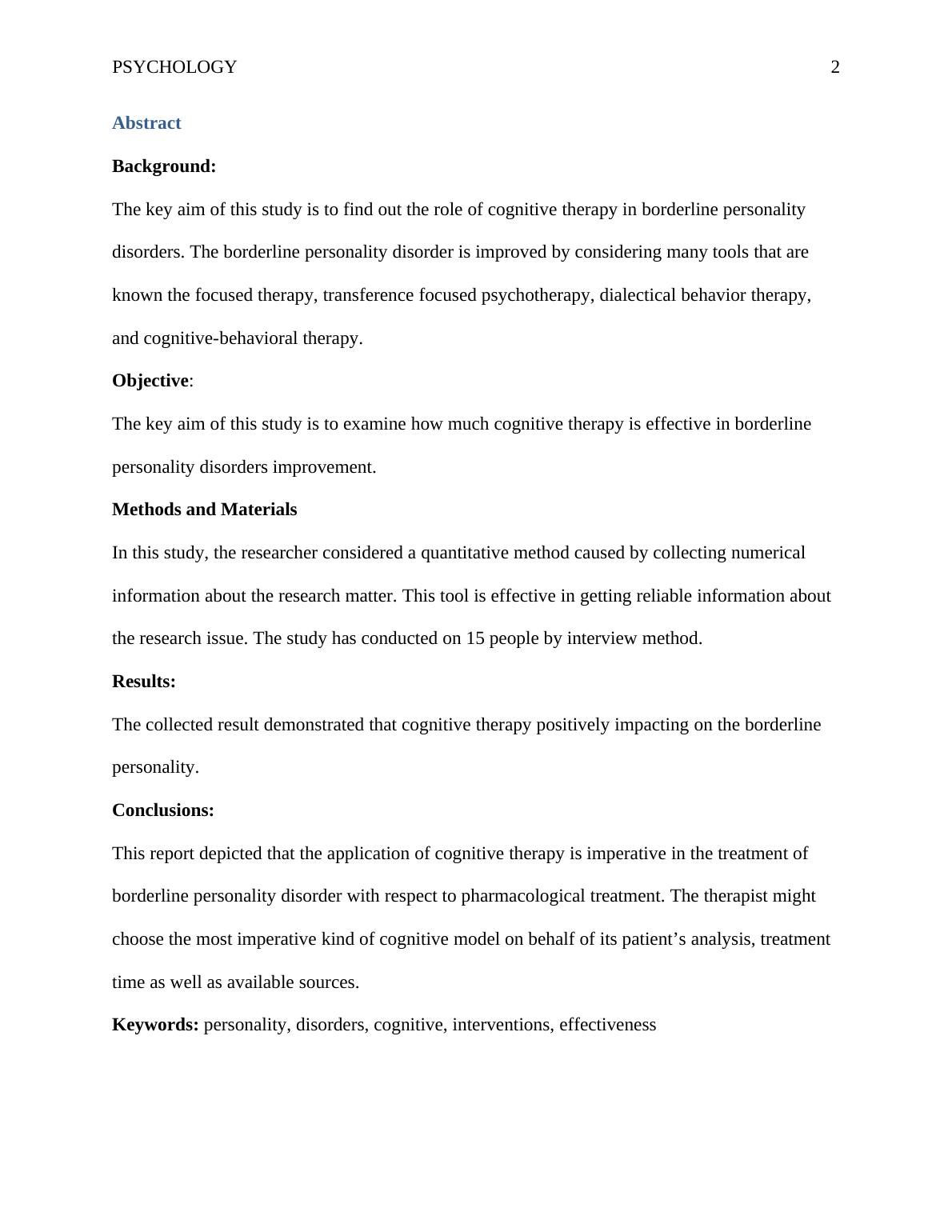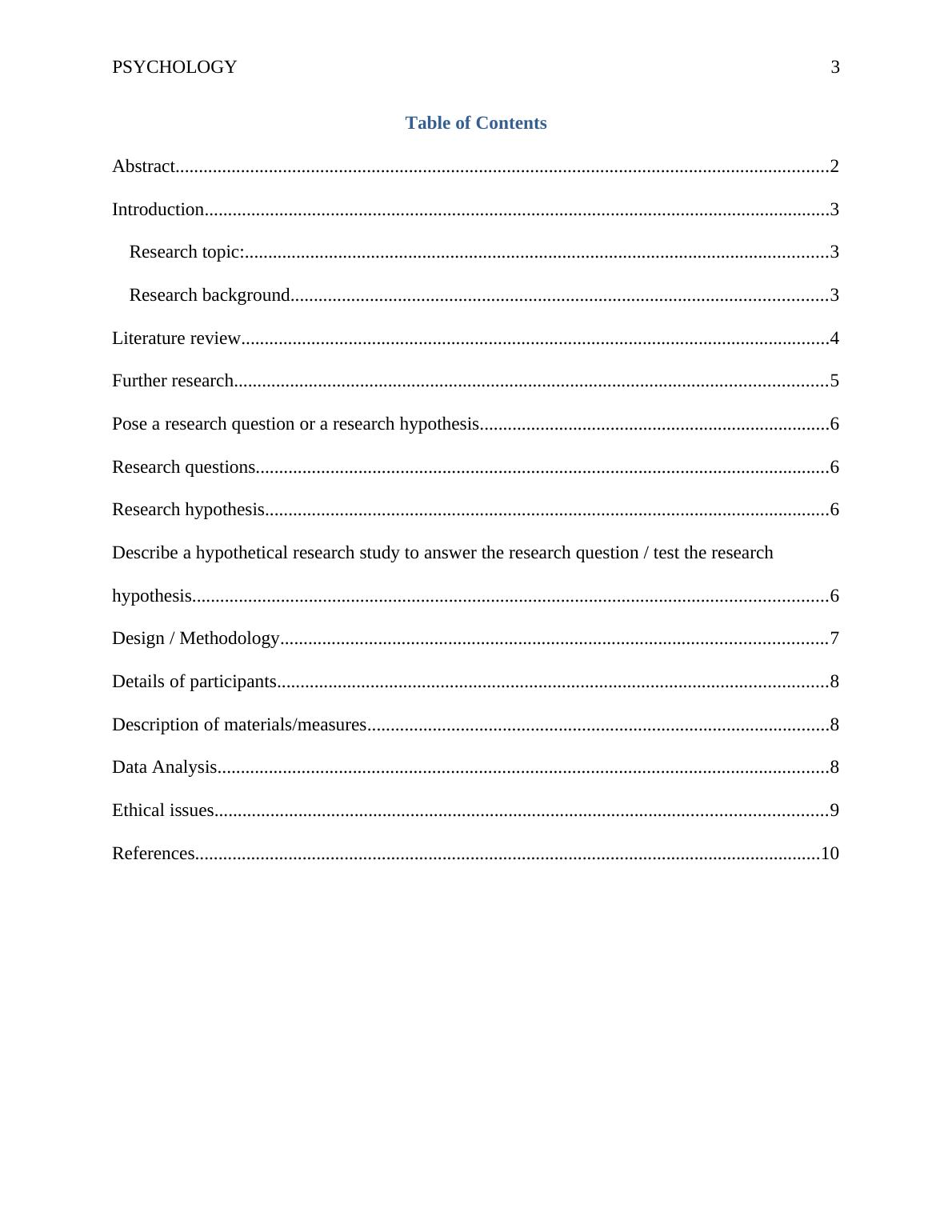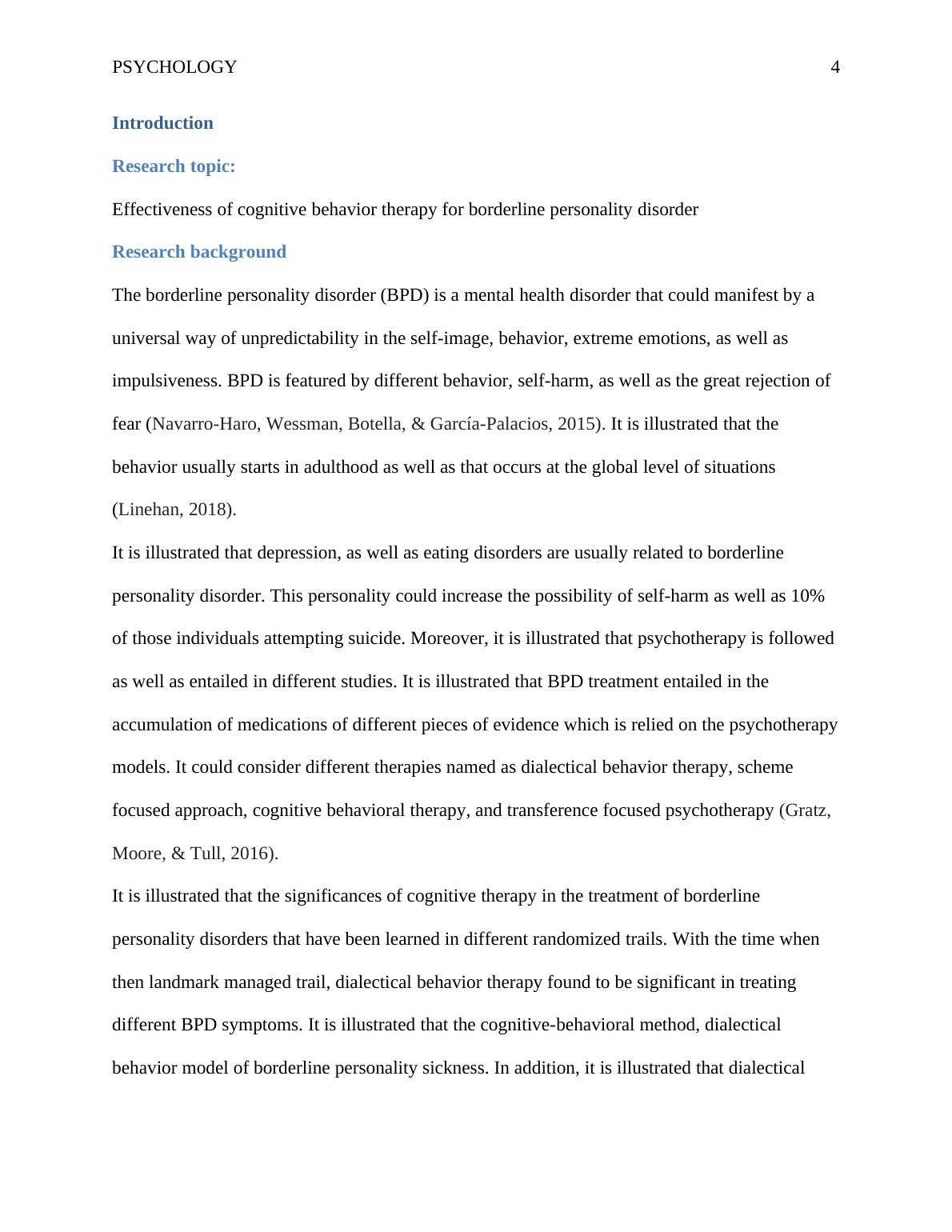Clinical Psychology - Cognitive Therapy
Added on 2022-08-13
12 Pages2865 Words33 Views
Running Head: PSYCHOLOGY
Clinical psychology
Clinical psychology

PSYCHOLOGY 2
Abstract
Background:
The key aim of this study is to find out the role of cognitive therapy in borderline personality
disorders. The borderline personality disorder is improved by considering many tools that are
known the focused therapy, transference focused psychotherapy, dialectical behavior therapy,
and cognitive-behavioral therapy.
Objective:
The key aim of this study is to examine how much cognitive therapy is effective in borderline
personality disorders improvement.
Methods and Materials
In this study, the researcher considered a quantitative method caused by collecting numerical
information about the research matter. This tool is effective in getting reliable information about
the research issue. The study has conducted on 15 people by interview method.
Results:
The collected result demonstrated that cognitive therapy positively impacting on the borderline
personality.
Conclusions:
This report depicted that the application of cognitive therapy is imperative in the treatment of
borderline personality disorder with respect to pharmacological treatment. The therapist might
choose the most imperative kind of cognitive model on behalf of its patient’s analysis, treatment
time as well as available sources.
Keywords: personality, disorders, cognitive, interventions, effectiveness
Abstract
Background:
The key aim of this study is to find out the role of cognitive therapy in borderline personality
disorders. The borderline personality disorder is improved by considering many tools that are
known the focused therapy, transference focused psychotherapy, dialectical behavior therapy,
and cognitive-behavioral therapy.
Objective:
The key aim of this study is to examine how much cognitive therapy is effective in borderline
personality disorders improvement.
Methods and Materials
In this study, the researcher considered a quantitative method caused by collecting numerical
information about the research matter. This tool is effective in getting reliable information about
the research issue. The study has conducted on 15 people by interview method.
Results:
The collected result demonstrated that cognitive therapy positively impacting on the borderline
personality.
Conclusions:
This report depicted that the application of cognitive therapy is imperative in the treatment of
borderline personality disorder with respect to pharmacological treatment. The therapist might
choose the most imperative kind of cognitive model on behalf of its patient’s analysis, treatment
time as well as available sources.
Keywords: personality, disorders, cognitive, interventions, effectiveness

PSYCHOLOGY 3
Table of Contents
Abstract............................................................................................................................................2
Introduction......................................................................................................................................3
Research topic:.............................................................................................................................3
Research background...................................................................................................................3
Literature review..............................................................................................................................4
Further research...............................................................................................................................5
Pose a research question or a research hypothesis...........................................................................6
Research questions...........................................................................................................................6
Research hypothesis.........................................................................................................................6
Describe a hypothetical research study to answer the research question / test the research
hypothesis........................................................................................................................................6
Design / Methodology.....................................................................................................................7
Details of participants......................................................................................................................8
Description of materials/measures...................................................................................................8
Data Analysis...................................................................................................................................8
Ethical issues...................................................................................................................................9
References......................................................................................................................................10
Table of Contents
Abstract............................................................................................................................................2
Introduction......................................................................................................................................3
Research topic:.............................................................................................................................3
Research background...................................................................................................................3
Literature review..............................................................................................................................4
Further research...............................................................................................................................5
Pose a research question or a research hypothesis...........................................................................6
Research questions...........................................................................................................................6
Research hypothesis.........................................................................................................................6
Describe a hypothetical research study to answer the research question / test the research
hypothesis........................................................................................................................................6
Design / Methodology.....................................................................................................................7
Details of participants......................................................................................................................8
Description of materials/measures...................................................................................................8
Data Analysis...................................................................................................................................8
Ethical issues...................................................................................................................................9
References......................................................................................................................................10

PSYCHOLOGY 4
Introduction
Research topic:
Effectiveness of cognitive behavior therapy for borderline personality disorder
Research background
The borderline personality disorder (BPD) is a mental health disorder that could manifest by a
universal way of unpredictability in the self-image, behavior, extreme emotions, as well as
impulsiveness. BPD is featured by different behavior, self-harm, as well as the great rejection of
fear (Navarro-Haro, Wessman, Botella, & García-Palacios, 2015). It is illustrated that the
behavior usually starts in adulthood as well as that occurs at the global level of situations
(Linehan, 2018).
It is illustrated that depression, as well as eating disorders are usually related to borderline
personality disorder. This personality could increase the possibility of self-harm as well as 10%
of those individuals attempting suicide. Moreover, it is illustrated that psychotherapy is followed
as well as entailed in different studies. It is illustrated that BPD treatment entailed in the
accumulation of medications of different pieces of evidence which is relied on the psychotherapy
models. It could consider different therapies named as dialectical behavior therapy, scheme
focused approach, cognitive behavioral therapy, and transference focused psychotherapy (Gratz,
Moore, & Tull, 2016).
It is illustrated that the significances of cognitive therapy in the treatment of borderline
personality disorders that have been learned in different randomized trails. With the time when
then landmark managed trail, dialectical behavior therapy found to be significant in treating
different BPD symptoms. It is illustrated that the cognitive-behavioral method, dialectical
behavior model of borderline personality sickness. In addition, it is illustrated that dialectical
Introduction
Research topic:
Effectiveness of cognitive behavior therapy for borderline personality disorder
Research background
The borderline personality disorder (BPD) is a mental health disorder that could manifest by a
universal way of unpredictability in the self-image, behavior, extreme emotions, as well as
impulsiveness. BPD is featured by different behavior, self-harm, as well as the great rejection of
fear (Navarro-Haro, Wessman, Botella, & García-Palacios, 2015). It is illustrated that the
behavior usually starts in adulthood as well as that occurs at the global level of situations
(Linehan, 2018).
It is illustrated that depression, as well as eating disorders are usually related to borderline
personality disorder. This personality could increase the possibility of self-harm as well as 10%
of those individuals attempting suicide. Moreover, it is illustrated that psychotherapy is followed
as well as entailed in different studies. It is illustrated that BPD treatment entailed in the
accumulation of medications of different pieces of evidence which is relied on the psychotherapy
models. It could consider different therapies named as dialectical behavior therapy, scheme
focused approach, cognitive behavioral therapy, and transference focused psychotherapy (Gratz,
Moore, & Tull, 2016).
It is illustrated that the significances of cognitive therapy in the treatment of borderline
personality disorders that have been learned in different randomized trails. With the time when
then landmark managed trail, dialectical behavior therapy found to be significant in treating
different BPD symptoms. It is illustrated that the cognitive-behavioral method, dialectical
behavior model of borderline personality sickness. In addition, it is illustrated that dialectical

End of preview
Want to access all the pages? Upload your documents or become a member.
Related Documents
Refined Reflection Template Assignment 2022lg...
|3
|603
|20
Borderline Personality Disorder and Nursing Care PDFlg...
|4
|588
|393
Dialectical Behavior Therapy Research Paper 2022lg...
|12
|3826
|18
Assessment and Counseling of a Hypothetical Client with Eating Disorder using Cognitive Behavioral Therapylg...
|8
|1953
|482
A Critical Review on Borderline Personality Disorderlg...
|12
|3762
|337
Elements of Ethical Psychology: Comparing Major Approaches to Clinical Psychology in Treating Depressive Disorderlg...
|10
|1019
|212
